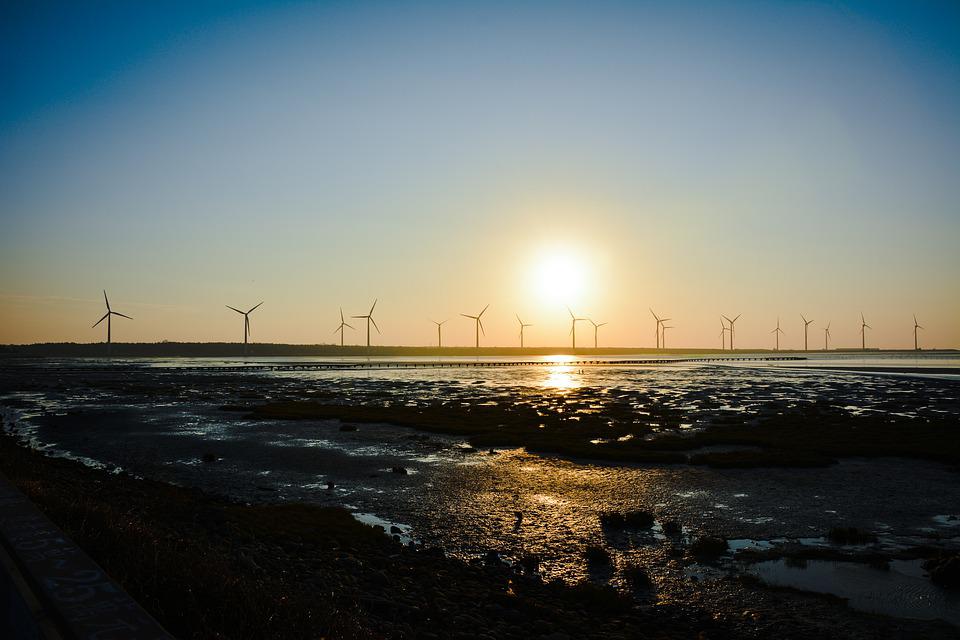

Clean Energy

I had the good fortune of staying at a cottage in Collingwood for a couple nights in June – perfectly timed to escape some of the oppressive heat and humidity that we get in Windsor every summer. The alleged purpose of the trip was to go golfing on a couple of golf courses with beautiful views and a little more challenge than I am capable of handling. It seems crazy that someone would go golfing for 36 holes expecting to lose 6 to 12 golf balls and call it fun – but here we are.
As a bonus, someone arranged a night out on a fishing boat on Georgian Bay, launched from Meaford. Our captain, Brent, was in his 30s but already had the worn hands of a man who did the hard, physical, construction work that I wasn’t cut out to handle. Brent moved his way around the boat with ease and frankly his pace looked both quick and relaxing at the same time. You could see his joy for fishing was the same as my joy for golf.
I was unaware when this adventure started that I would be expected to catch fish. It has been a long-time since high school when a buddy and I rented a small boat on Lake Simcoe and fished – the only thing that came of that day was drinking some beer and realizing that I didn’t have the patience to sit in a boat waiting for something to happen – my life has been spent filling empty time with activity which I now know is not entirely Zen.
Brent did all the work right up to the point that there was a fish on the line at which point rod and reel was handed to me. Sadly, it was a quiet night and the one shot I had and bringing a fish into the boat ended with the fish ‘spitting’ out the hook. As a consolation, one fish was caught which became part of our dinner the next night. Overall, I found myself falling in love with fishing not for the excitement of catching fish but for the tranquility of being on the water. I get why some people love sailing or boating and I am hoping to go back in the fall for Salmon fishing.
Conservation
I like to think of myself as a practical conservationist. When you are on a boat on Georgian Bay you experience its beauty in its fullest and you realize it is something that we should protect. With that said, there is a practical reality that we need to build bridges for commerce and while there is no doubt that building a bridge over the Detroit River will harm some natural habitat, I am on the side of small sacrifices for the greater good of human life. Of course, the cost-benefit analysis of progress is tricky. I haven’t done the homework on Ontario’s new Highway 413 but there are many voices expressing concern that the environmental cost far exceeds our economic benefit. I can’t take a side today, but it is an interesting question for another day.
Out on the bay, Captain Brent reminded us that the hydro-electric project planned for the area would ruin the fishing. Hydro-electric what? I had never heard anything about this project. Safely on land and back at the cottage I started my homework – it seemed impossible to me that the economic benefit of generating electricity could outweigh the environmental sacrifice that the good captain abhorred. Amazingly, the research was easy since the facts are in the open in plain sight. TC Energy (formerly known as TransCanada Pipelines) is behind the project.
In a nutshell, the idea is to pump water out of the bay uphill and store it in a reservoir and then release the water back down the hill running through generators thus producing electricity. For those readers who took high school physics you will remember that you can’t generate energy for free and if all the machines in this scheme were 100% efficient (no machine is) then you would use the same energy getting the water uphill that you would generate having it come back down. It took me a few minutes to figure out that the arbitrage in this idea was to pump uphill at night when electricity is cheap and generate electricity during the day when demand and prices on the grid are high.
For those unaware, you can’t turn nuclear power on and off like you can with other methods of producing electricity – so in Ontario we have a ‘base load’ of power that is generated 24 hours a day and if we can’t use the power it needs to go somewhere or you overload the grid. The solution is that Ontario sells its excess power at night and depending on movements in the supply and demand curves sometimes we pay other users (notably the US) to take our excess energy. The Georgian Bay proposal redirects that excess energy at night and then brings the energy back online in the day. Clever really if the math says we win economically provided that we don’t destroy our environment at the same time.
Nuclear Power
I have written before that I grew up being indoctrinated into the belief that nuclear energy was the clean and inexpensive solution to our ever growing demand for energy. The fact that people worry about overstated concerns around nuclear waste and accidents is a distraction from the fact that nuclear energy is the fastest road to reducing carbon emissions.
Somehow in Germany, nuclear power was vilified after the accident at Fukushima in 2011 and in the last decade their nuclear plants have been closing. In a crazy turn of events, to deal with the boycott of Russian oil and gas arising from the war in Ukraine, Germany is ramping back up its coal fired plants rather than turning nuclear back on. I get people’s worries about nuclear safety but given the daily barrage of media attention on climate change and the largely accepted view that spewing carbon in the air is its primary cause, it seems to me that we need to be running away from coal – not towards it.
Back to Collingwood and Oakville
TC Energy’s original plan was to build intake and outlet pipes at the shoreline and a near kilometer long breakwall to allow for the flow of water. This is what Brent said would ruin the fishing habitat. The revised plan calls for the pipes to be buried below the lakebed. I can’t tell you the impact on fishing the revised proposal will cause – but it’s a question that will be studied before the project goes ahead.
It is a hard tradeoff between on one hand heating our homes as well as growing and transporting our food and on the other hand saving our planet. There will always be debate on what choices are right. If you are sitting in Toronto or Windsor, you might not have been aware that demanding that Ontario get its energy prices under control might ruin one of the more beautiful places in Canada.
At the same time, everyone is on the hook to contribute to the solutions to our energy challenges. In 2011, the then governing Ontario Liberals, to win an election, promised to cancel two already in-progress gas plants designed to produce electricity from natural gas. The plants were approved by that same government and were needed because that same government approved in 2008 to close the coal fired Lakeview Generating Station in Mississauga. One of the new gas plants was down the road from where I grew up at Winston Churchill Boulevard and cost Ontario taxpayers $675 million to cancel. I am still angry about the wasted money.
The moral to the story is that we need energy to survive and we need to find the best solutions to deliver energy that is clean and affordable. If you ask me whether I would rather have a gas plant on an old piece of land in Oakville that was zoned industrial long before the wealthy voters of Oakville built their homes or if I would rather ruin a corner of Georgian Bay I think you know how I would vote – but most voters struggle to see the greater good and want someone in another community to do the dirty work of generating the energy that they want.
My solution? Ontario should be charging variable rates to energy users depending on how far they are located from where the energy is produced. The other option is that when the demand on the grid exceeds supply, we shut down the power to the communities farthest from where it is generated. If the Ontario government employed these approaches and then asked communities who wanted one of our two new gas plants – the citizens of Oakville would have used all their pollical might to be sure that one of the plants was built in their backyard.
People get confused on how interconnected the world is at this stage. With a war in Ukraine and gas here at home over $2 a litre, it is hard to know how quickly we can afford to quit the carbon habit and doing so will create winners and losers. In the meantime, it has never been truer that we are all in this together.



Comments